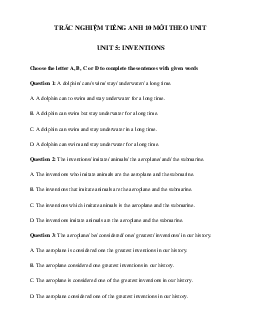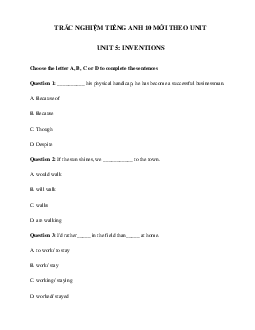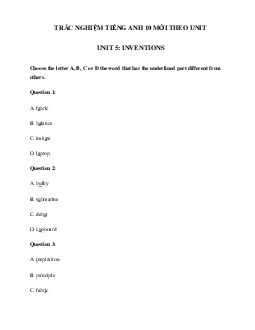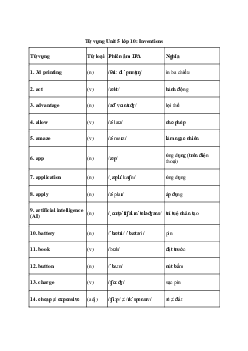





Preview text:
TRẮC NGHIỆM TIẾNG ANH 10 MỚI THEO UNIT UNIT 5: INVENTIONS
Read the passage below and decide whether the statements are TRUE or FALSE?
We are all around computers. Computers play an important play in our day to day lives, like
we are very much dependent them for doing many things including giving users the ability
to quickly and easily store and process data. Since the invention of computer they have
evolved in terms of increased computing power and decreased size. Computers are used in
many sectors like Education, Health and Medicine, Financial Institutions, Transport System, E-Commerce, Defence etc.
Computers connect us to the world of unknown. They help us gathering knowledge and huge
information from the internet and storing it. Computers are multitasking and accurate
enough to be used almost anywhere and everywhere including banks. Computer provide
security from destructive forces and from unwanted action from unauthorized users like
cyber attack or access attack.
Now computer is not just a calculating device, it has become much more than that. One of
the main advantages of computer is its incredible speed, which helps human to complete
their task in few seconds. All the operations can be performed very fast just because of its
speed else wise it takes a long time to perform the task.
Question 1: Computers help store and process data. A. True B. False
Question 2: Computers are not used in Defence. A. True B. False
Question 3: Banks use computers because they’re multitasking and accurate. A. True B. False
Question 4: Computers provides prevention against cyber attack or access attack. A. True B. False
Question 5: Computers are not speedy enough to help human to complete their task in few seconds. A. True B. False Đáp án 1. A 2. B 3. A 4. A 5. B
Choose the letter A, B, C or D to complete the passage below
There is a lot of controversy surrounding the invention __________ (6) the telephone. There
have been court cases, books, and articles generated about the subject. Of course, Alexander
Graham Bell is the father of the telephone. After all it was his design that was first
__________ (7), however, he was not the first inventor to come up __________ (8) the idea of a telephone.
Antonio Meucci, an Italian immigrant, began developing the design of a talking telegraph or
telephone __________ (9) 1849. In 1871, he filed a caveat (an announcement of an
invention) for his design of a talking telegraph. Due to hardships, Meucci could not renew
his caveat. His role in the invention of the telephone was overlooked until the United States
House of Representatives __________ (10) a Resolution on June 11, 2002, honoring
Meucci's contributions and work. You can read the resolution (107th Congress, H Res 269) on Congress.gov.
To make matters even more interesting some researchers suggest that Elisha Gray, a
professor at Oberlin College, applied for a caveat of the telephone on __________ (11) same
day Bell applied for his patent of the telephone- these gentlemen didn’t actually visit the
Patent Office, their lawyers did __________ (12) their behalf. In Historical First Patents:
The First United States Patent for Many Everyday Things (Scarecrow Press, 1994), Travis
Brown, reports that Bell’s lawyer got to the patent office first. The date was February 14,
1876. He was the fifth entry of that day, __________ (13) Gray’s lawyer was 39th.
Therefore, the U.S. Patent Office ___________ (14) Bell with the first patent for a telephone,
US Patent Number 174,465 rather than honor Gray's caveat. _________, (15) some authors
dispute this story and suggest that there was malfeasance by certain individuals at Patent
Office, and possibly Bell himself. Question 6: A. of B. to C. with D. for Question 7: A. to patent B. to offer C. to invent D. to open Question 8: A. for B. on C. with D. of Question 9: A. on B. at C. in D. of Question 10: A. pass B. passed C. passing D. to pass Question 11: A. a B. x C. an D. the Question 12: A. at B. on C. for D with Question 13: A. because B. when C. while D. although Question 14: A. provided B. supported C. objected D. awarded Question 15: A. Therefore B. However C. Because D. As Đáp án: 6. A 7. A 8. C 9. C 10. B 11. D 12. B 13. B 14. D 15. D



